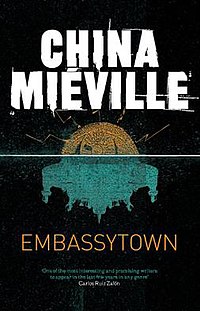--The blurb--
"Embassytown: a city of contradictions on the outskirts of the universe.
Avice is an immerser, a traveller on the immer, the sea of space and
time below the everyday, now returned to her birth planet. Here on
Arieka, humans are not the only intelligent life, and Avice has a rare
bond with the natives, the enigmatic Hosts - who cannot lie. Only a tiny
cadre of unique human Ambassadors can speak Language, and connect the
two communities. But an unimaginable new arrival has come to
Embassytown. And when this Ambassador speaks, everything changes.
Catastrophe looms. Avice knows the only hope is for her to speak
directly to the alien Hosts. And that is impossible."
--The review--
Dystopian literature has a strong history, and any newcomer on the scene has a hard nut to crack. However, with positive coverage in several high-quality publications such as the Financial Times, China Miéville's Embassytown, published in 2011, is doing a great deal to bring this writer to the fore: Miéville's reputation has been building up gradually, with his first novel being published in the year 1998. The Guardian even went as far as to aver that Embassytown would be nominated for the Booker Prize. So how far does this novel contend with established dystopian classics such as The Handmaid's Tale, The Time Machine, and Brave New World?
All of the initial signs are promising, with Miéville raising questions from the book's very first moments. What is the embassy of the title? Who are the shiftparents? What is the voidcraft and the Arrival Ball? What is the edge? Confusing yet enthralling, Embassytown is packed with fantastical and charming oddities, such as string septets. Imaginative, rich, and full of possibilities for future rereads, Miéville cleverly combines intriguing new aspects with hints of familiarity: the "thumb-sized vespcams hunting for images to transmit" without doubt carry echoes of the surveillance society in which some people argue that we live today. To begin with, the novel is poetic yet lucid; we are lulled by the author's clever use of alliteration, and simultaneously unsettled by the content. Continued questions make us keep reading; we want to know why communication will be difficult for the principal characters, and what the meanings of Miéville's foreboding neologisms (miab, yawl...) could be. The language of the ambassadors and hosts also proves a masterful creation that ultimately constitutes one of the novel's highlights.
However, as time goes on Miéville fails to build on the aspects of society that we already find familiar. One of the hallmarks of good science fiction is the writer's ability to build on the reader's fear that one day this could be their world; however, Miéville focuses more on the realm of fantasy, and many of the bizarre constructions and the characteristics of the people that make up Embassytown go unexplained. Even though characters and situations are developed, readers are left with too many crucial questions unanswered for these to be fully effective or moving. This is not usually a characteristic of well-written science fiction; it is possible, however, that readers who are better versed in reading a wider range of science fiction will benefit more from Embassytown and be better able to read between the lines.
While the author could have the chance to take his place in the dystopian fiction hall of fame, Embassytown would need far greater clarity for this to occur (which could be resolved if Miéville slackened his writing pace, as he currently seems to publish novels relatively frequently). However, the earlier comment about rereads still stands; the novel is so rich in detail and ambition that it's possible that readers' questions may be answered upon further inspection.
other novels by China Miéville
King Rat (1998)
Perdido Street Station (2000)
The Tain (2002)
The Scar (2002)
Iron Council (2004)
Un Lun Dun (2007)
The City and The City (2009)
Kraken (2010)
Railsea (2012)
First three Chapters....
16 years ago






No comments:
Post a Comment